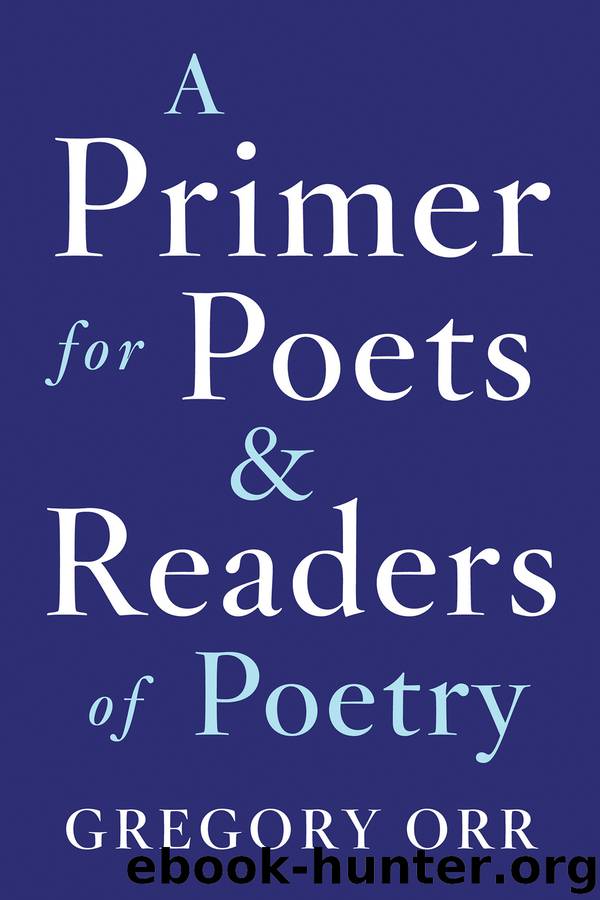A Primer for Poets and Readers of Poetry by Gregory Orr

Author:Gregory Orr
Language: eng
Format: epub
Publisher: W. W. Norton & Company
Published: 2017-09-10T16:00:00+00:00
Nouns connect us to the world through Naming, and that connection is a source of wonder and delight. You can see it in its naïve glory and glee in the face of a two-year-old who’s just learning language and shouts “doggie! doggie!” whenever that creature enters the room.
The variety of images brought before the mind’s eye by the naming of things is rich and varied. Think how each of the following nouns summons a different bird image: sparrow, egret, pigeon, chickadee, robin, eagle, swan, swallow, parakeet, penguin, finch.
Or consider the accuracy of verbs. Think how each of the following verbs names a different way a person might move down a sidewalk: amble, stride, stumble, race, stroll, run, sashay, hobble.
How much precise information the right nouns and verbs convey!
Oddly enough, adjectives are less useful to poets, less important to poetry than they are to prose. Maybe this has to do with poetry’s desire to compress and focus the reader’s attention in order to get to the heart of something right away. After all, we usually don’t have twenty pages in which to create a world in poems; we have to move quickly and efficiently, trying to capture the essence of that world. But it isn’t only that nouns and verbs are more efficient than adjectives; there’s also the issue of a lazy writer bullying his or her readers with adjectives. When someone says “the amazing dog” or “the beautiful dog” in writing, the language is telling the reader rather than showing. And there’s another issue with the use (or misuse) of adjectives. We’ve been taught since grade school that to enlarge our vocabulary is to show that we’re smart; that as we proceed in our education, we can accumulate all sorts of elaborate adjectives (e.g., munificent, audacious, intriguing, scabrous) that might turn up on vocabulary quizzes or statewide tests. We’re also told that this large vocabulary of adjectives will make our writing richer and more various—and for all I know, that might be true about writing prose. But for poets, the main goal is often to focus on the heart of a scene or situation with precise nouns and verbs; elaborate and showy adjectives can clutter our lines and distract our readers.
The one big exception to this advice concerns color adjectives. For some reason, color words have a vividness that even poets respect. Almost inexplicably, the phrase “the blue truck” provides a more vivid image than “the truck.” Maybe the reason for this is obvious, maybe not—but many poets appreciate what color adjectives can accomplish.
It can be hard to realize that Naming and describing are different. Naming seldom involves description, which can be extremely important in prose writing but can be clumsy and awkward in poetry. Naming is succinct. Using precise and accurate Naming, lyric poets hope that they can conjure up not only the thing they’re naming, but also its mystery and wonder.
Download
This site does not store any files on its server. We only index and link to content provided by other sites. Please contact the content providers to delete copyright contents if any and email us, we'll remove relevant links or contents immediately.
The Universe of Us by Lang Leav(15071)
The Sun and Her Flowers by Rupi Kaur(14511)
Adultolescence by Gabbie Hanna(8923)
Whiskey Words & a Shovel II by r.h. Sin(8009)
Love Her Wild by Atticus(7753)
Smoke & Mirrors by Michael Faudet(6185)
Wiseguy by Nicholas Pileggi(5772)
The Princess Saves Herself in This One by Amanda Lovelace(4973)
Love & Misadventure by Lang Leav(4843)
Memories by Lang Leav(4797)
Milk and Honey by Rupi Kaur(4743)
Bluets by Maggie Nelson(4548)
Too Much and Not the Mood by Durga Chew-Bose(4339)
Pillow Thoughts by Courtney Peppernell(4274)
Good morning to Goodnight by Eleni Kaur(4232)
The Poetry of Pablo Neruda by Pablo Neruda(4099)
Algedonic by r.h. Sin(4057)
HER II by Pierre Alex Jeanty(3606)
Stuff I've Been Feeling Lately by Alicia Cook(3452)
